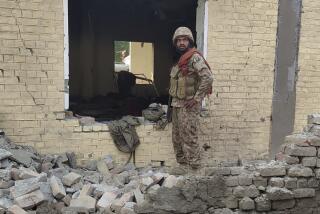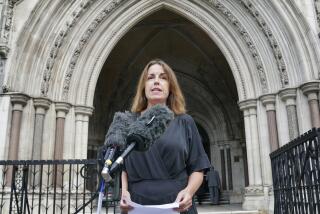Militants kill 8 in raid on British compound in Afghanistan
Militants used suicide bombers, automatic rifles and rocket grenades to launch an hours-long commando-style raid on a British compound in Kabul on Friday that killed at least eight people. The brazen attack underscored the militants’ ability to unleash large-scale assaults even in the heavily secured Afghan capital.
The Taliban claimed responsibility for the attack on the compound housing the British Council, saying it was meant to coincide with the anniversary of Afghanistan’s independence from Britain 92 years ago. The British Council is an agency funded by Britain’s government that fosters the development of education and civil society in other countries.
The attack began about 6 a.m. when insurgents detonated a car bomb outside the council compound, located in an upscale residential area, said Seddiq Seddiqi, a spokesman for the Afghan Interior Ministry. After four or five militants wearing suicide bomb vests rushed into the compound, at least one of the assailants detonated his explosives while the others began an intense gunfight with Afghan and NATO security forces that lasted for more than six hours.
Most of the people killed in the attack were Afghan police officers, Seddiqi said, adding that one of the dead may have been a foreigner who worked at the compound as a guard. Reuters reported that three Nepalese guards assigned to the compound were killed in the assault. Sixteen people were injured, most of them Afghan police officers. None of the attackers survived.
In London, the British Council’s chief executive, Martin Davidson, said three British citizens who work at the council’s Kabul office were present at the time of the attack. None of them were hurt.
“It is a place where we meet and have conversations with young Afghans from right across society,” Davidson said, adding that the focus of the council’s work in Afghanistan is on education. “It’s a very important contribution that we are able to make, to provide that normal access to the Western world that they want so badly.”
British Prime Minister David Cameron called the assault “a vicious and cowardly attack, but it’s an attack that hasn’t succeeded. … It will not stop the British Council, and indeed our whole effort in Afghanistan to bring stability and peace to that country.”
Afghan President Hamid Karzai also condemned the attack, saying such assaults “show [the militants’] weakness when facing Afghan security forces.”
Though the Taliban probably hoped the attack would cause more widespread carnage, its spokesman, Zabiullah Mujahid, said the militant group achieved its aim of sending Britain a message that “you and other invaders will face the same fate as your forefathers faced in Afghanistan.”
Afghanistan’s army and police essentially have been responsible for safeguarding Kabul since 2008, though U.S. and North Atlantic Treaty Organization forces still maintain a strong presence in the capital.
Times staff writer Rodriguez reported from Islamabad and special correspondent Baktash from Kabul. Special correspondent Aimal Yaqubi in Kabul and staff writers Henry Chu and Janet Stobart in London contributed to this report.
More to Read
Start your day right
Sign up for Essential California for news, features and recommendations from the L.A. Times and beyond in your inbox six days a week.
You may occasionally receive promotional content from the Los Angeles Times.





